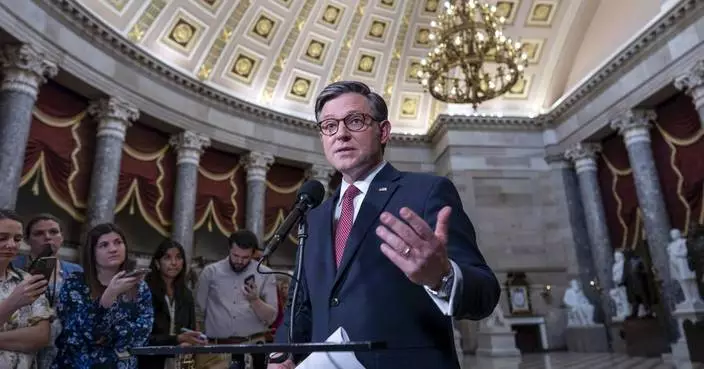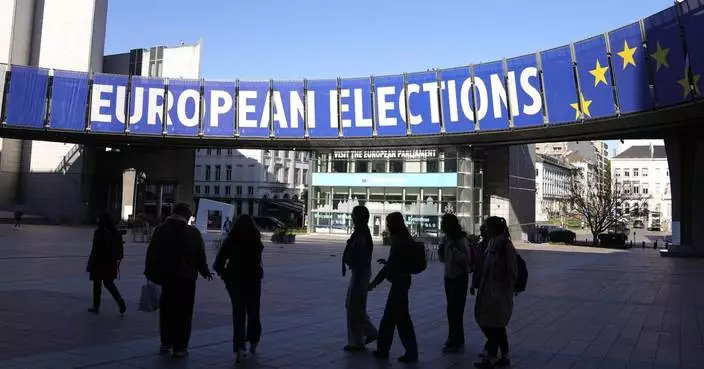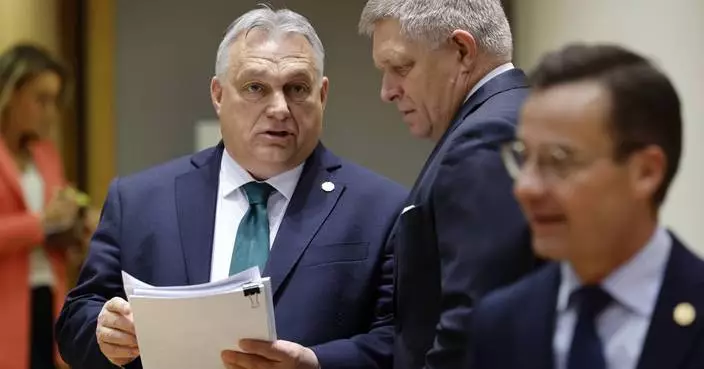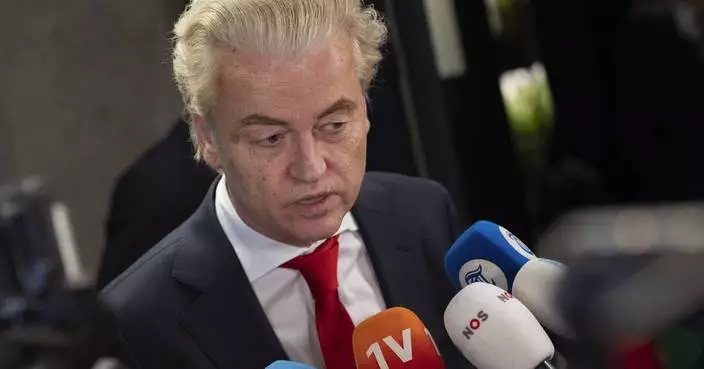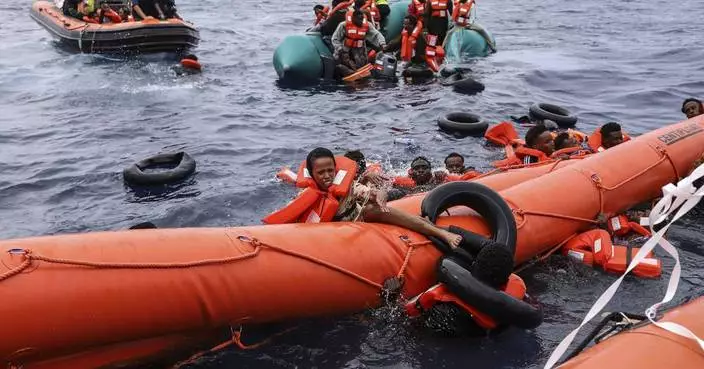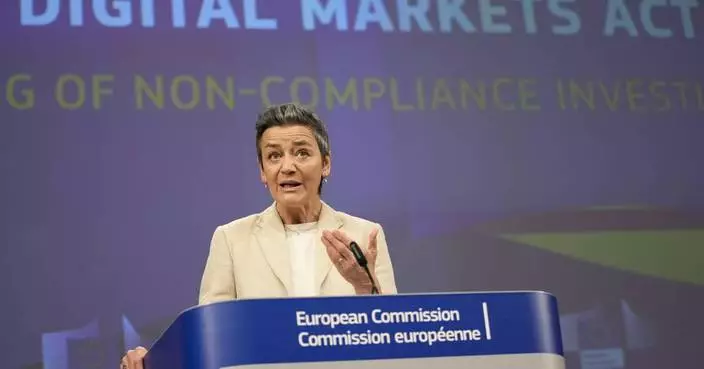Ukraine's presidential election on Sunday will pit image against experience, with polls suggesting TV comedian Volodymyr Zelenskiy heading for an overwhelming victory against President Petro Poroshenko.
Poroshenko has held the office for nearly five years — while Zelenskiy has played the role on television for more than three.
A look at the two contenders to lead Ukraine's 42 million people:
VOLODYMYR ZELENSKIY
Zelenskiy, a 41-year-old comic actor, is best known for his TV portrayal of a schoolteacher who becomes president after a video of him denouncing corruption goes viral. The name of the show, "Servant of the People," became the name of his party when he announced his candidacy in January.
Like his TV character, the real-life Zelenskiy has focused his campaign strongly on corruption. Although criticized as having a vague platform, Zelenskiy has made specific proposals, including removing immunity for the president, parliament members and judges, and a lifetime ban on holding public office for anyone convicted of corruption. He also calls for a tax amnesty under which someone holding hidden assets would declare them, be taxed at 5% and face no other measures.
He supports Ukraine's eventual membership in NATO, but only if the country were to approve this in a referendum.
Zelenskiy has proposed that direct talks with Russia are necessary to resolve the conflict in eastern Ukraine, where fighting with Russia-backed separatist rebels has killed more than 13,000 people since 2014. The Kremlin denies involvement there and says it is an internal matter. Zelenskiy says Russia-annexed Crimea must be returned to Ukraine and compensation paid.
His campaign has relied on social media rather than traditional rallies, leading Poroshenko to sneer that he is a "virtual candidate." His flair for showmanship have raised eyebrows — he has proposed that both he and Poroshenko should take drug tests ahead of a debate.
Zelenskiy's image has been shadowed by his admission that he had commercial interests in Russia through a holding company, and by persistent speculation about links with oligarch Ihor Kolomoyskyi, who owns the television station that airs "Servant of the People."
A Ukrainian court on Thursday ruled that the nationalization of a bank once owned by Kolomoyskyi was illegal, leading to new concern about Zelenskiy's possible ties to him.
PETRO POROSHENKO
Poroshenko, the incumbent, came to power in 2014 with the image of a "good oligarch." The bulk of his fortune came from a seemingly innocuous source, the chocolate-maker Roshen, hence his nickname "The Chocolate King."
He promised to divest himself of the whole business upon becoming president.
Five years later, there's little sweetness left in his image. He hasn't sold the chocolate business. Critics denounce him for having done little to combat Ukraine's endemic corruption. The war with Russia-backed separatists in the east grinds on with no clear strategy for ending it. And while his economic reforms may have pleased international lenders, they've left millions of Ukrainians wondering if they can find the money to pay their utilities bills.
After his weak performance in the election's first round, in which Zelenskiy got nearly twice as many votes, Poroshenko said he had taken voters' criticism to heart. He has since made some strong moves, including the long-awaited creation of an anti-corruption court. He also ordered the dismissal of the governor of the corruption-plagued Odessa region, and fired the deputy head of foreign intelligence who reportedly has vast real estate holdings in Russia.
Poroshenko has positioned himself as a leader who will stand up to Russia: a campaign billboard showed him staring down Russian President Vladimir Putin.
The 53-year-old Poroshenko has scored some significant goals for Ukraine's national identity and its desire to move out of Russia's influence.
He signed an association agreement with the European Union — which predecessor Viktor Yanukovych turned away from, setting off the protests that eventually drove him out of office. Ukrainians now can travel visa-free to the European Union, a significant perk. He has also pushed relentlessly for the Ukrainian Orthodox Church to be recognized as self-standing rather than just a branch of the Russian church.
NICOSIA, Cyprus (AP) — The governments of eight European Union member states said Friday the situation in Syria should be re-evaluated to allow for the voluntary return of Syrian refugees back to their homeland.
In a joint statement, officials from Austria, the Czech Republic, Cyprus, Denmark, Greece, Italy, Malta and Poland said they agree on a re-assessment that would lead to “more effective ways of handling” Syrian refugees trying to reach European Union countries.
The eight countries, which held talks during a summit meeting in the Cypriot capital, said the situation in Syria has “considerably evolved,” even though complete political stability hasn't been achieved.
Cyprus has in recent months seen an upsurge of Syrian refugees reaching the island nation primarily from Lebanon aboard rickety boats.
Earlier this month, the EU announced a 1 billion euro ($1.06 billion) aid package for Lebanon aimed at boosting border controls to halt the flow of asylum seekers and migrants to Cyprus and Italy.
The eight countries said the EU should further boost support for Lebanon to "mitigate the risk of even greater flows from Lebanon to the EU.”
“Decisions as to who has the right to cross a member state’s borders, should be taken by the government of the relevant member state and not by criminal networks engaged in migrant smuggling and trafficking in human beings,” the joint statement said.
The call comes a day afte r 15 EU member countries publicly called for the bloc to boost partnerships with countries along migratory routes in hopes of heading off attempts to reach EU countries.
The countries said that while they “fully embrace” the need to support Syrian refugees in line with international law, they hoped their talks could open a wider debate within the 27-member bloc on the process of granting the migrants international protection.
“What European citizens want from us ... are solutions, practical, realistic solutions that can be implemented,” said Greek Migration Minister Dimitris Kairidis.
Cypriot Interior Minister Constantinos Ioannou said the United Nations' refugee agency has already “established lines of communication” with Syrian authorities regarding possible voluntary returns in line with international law.
The Cypriot minister said returns would initially be on a voluntary basis, but that could develop into forced returns at a later stage. Much more needs to be done for that to happen because the government of Syrian President Bashar Assad isn't recognized by the EU, he said.
In Lebanon, where anti-refugee sentiment has been surging recently, more than 300 Syrian refugees returned to Syria in a convoy earlier this week.
Lebanese officials have long urged the international community to either resettle the refugees in other countries or help them return to Syria.

Cyprus' interior minister Konstantinos Ioannou, right, talks to the media during a press conference as his counterparts Austria's Gerhard Karner, left, and Czech's Vít Rakusan stand by during the Ministerial Summit Migration and Syria Dynamics in capital Nicosia, Cyprus, Friday, May 17, 2024. The governments of eight European Union member states say the situation inside Syria should be re-evaluated to allow for voluntary returns of Syrian refugees back to their homeland. (AP Photo/Petros Karadjias)

Cyprus' interior minister Konstantinos Ioannou, second right, talks to the media during a press conference as his counterparts Austria's Gerhard Karner, left, Czech's Vít Rakusan, second left, and Greece's Minister Of Immigration and Asylum Dimitris Kairides, right, stand by, during the Ministerial Summit Migration and Syria Dynamics in capital Nicosia, Cyprus, Friday, May 17, 2024. The governments of eight European Union member states say the situation inside Syria should be re-evaluated to allow for voluntary returns of Syrian refugees back to their homeland. (AP Photo/Petros Karadjias)
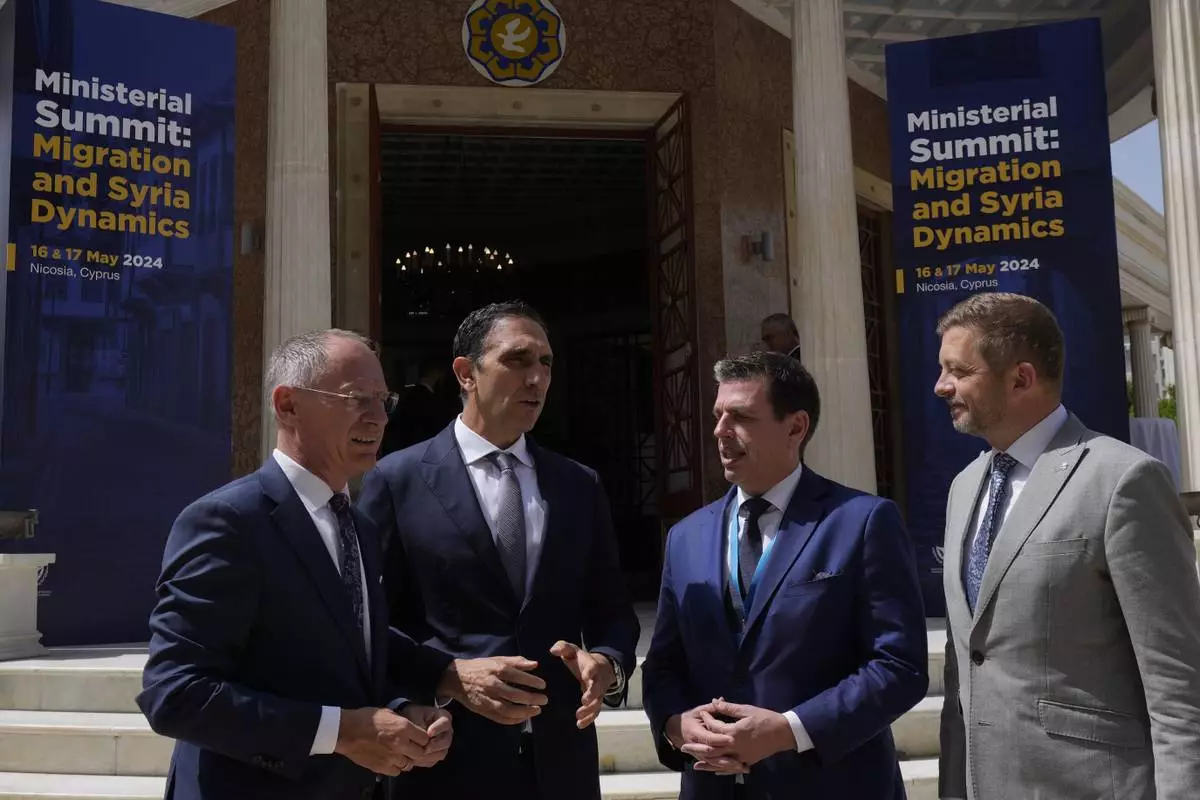
Cyprus' interior minister Konstantinos Ioannou, second left, talks with his counterparts Austria's Gerhard Karner, left, Czech's Vít Rakusan, right, and Greece's Minister Of Immigration and Asylum Dimitris Kairides, second right, stand by, during the Ministerial Summit Migration and Syria Dynamics in capital Nicosia, Cyprus, Friday, May 17, 2024. The governments of eight European Union member states say the situation inside Syria should be re-evaluated to allow for voluntary returns of Syrian refugees back to their homeland. (AP Photo/Petros Karadjias)
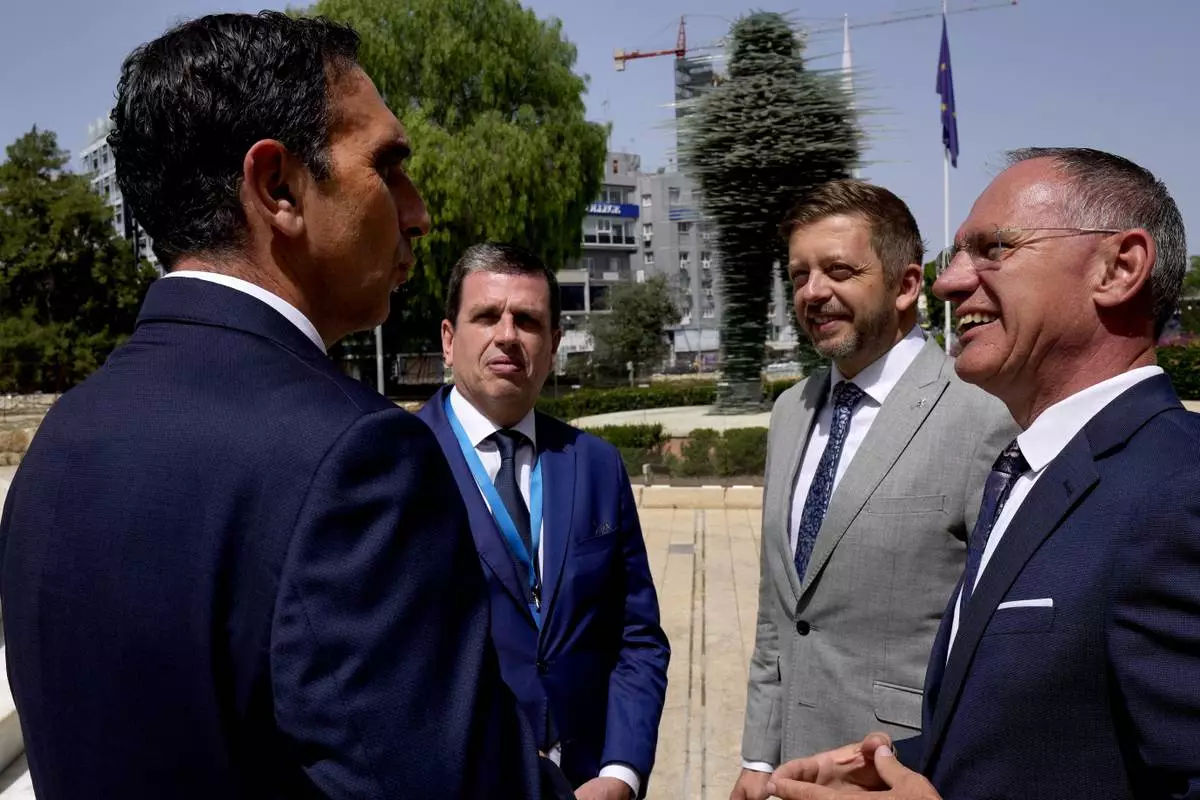
Cyprus' interior minister Konstantinos Ioannou, left, talks with his counterparts Austria's Gerhard Karner, right, Czech's Vít Rakusan, second right, and Greece's Minister Of Immigration and Asylum Dimitris Kairides, second left, during the Ministerial Summit Migration and Syria Dynamics in capital Nicosia, Cyprus, Friday, May 17, 2024. The governments of eight European Union member states say the situation inside Syria should be re-evaluated to allow for voluntary returns of Syrian refugees back to their homeland. (AP Photo/Petros Karadjias)

Cyprus' interior minister Konstantinos Ioannou, second left, talks with his counterparts Austria's Gerhard Karner, left, Czech's Vít Rakusan, right, and Greece's Minister Of Immigration and Asylum Dimitris Kairides, second right, during the Ministerial Summit Migration and Syria Dynamics in capital Nicosia, Cyprus, Friday, May 17, 2024. The governments of eight European Union member states say the situation inside Syria should be re-evaluated to allow for voluntary returns of Syrian refugees back to their homeland. (AP Photo/Petros Karadjias)








